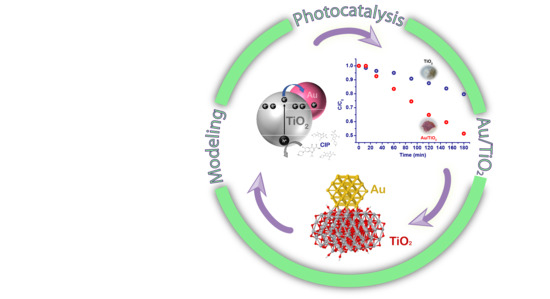In the last decades, photocatalysis has arisen as a solution to degrade emerging pollutants such as antibiotics. However, the reduced photoactivation of TiO2 under visible radiation constitutes a major drawback because 95% of sunlight radiation is not being used in this process. Thus, it is critical to modify TiO2 nanoparticles to improve the ability to absorb visible radiation from sunlight. This work reports on the synthesis of TiO2 nanoparticles decorated with gold (Au) nanoparticles by deposition-precipitation method for enhanced photocatalytic activity. The produced nanocomposites absorb 40% to 55% more radiation in the visible range than pristine TiO2, the best results being obtained for the synthesis performed at 25 °C and with Au loading of 0.05 to 0.1 wt. %. Experimental tests yielded a higher photocatalytic degradation of 91% and 49% of ciprofloxacin (5 mg/L) under UV and visible radiation, correspondingly. Computational modeling supports the experimental results, showing the ability of Au to bind TiO2 anatase surfaces, the relevant role of Au transferring electrons, and the high affinity of ciprofloxacin to both Au and TiO2 surfaces. Hence, the present work represents a reliable approach to produce efficient photocatalytic materials and an overall contribution in the development of high-performance Au/TiO2 photocatalytic nanostructures through the optimization of the synthesis parameters, photocatalytic conditions, and computational modeling.

In the last decades, photocatalysis has arisen as a solution to degrade emerging pollutants such as antibiotics. However, the reduced photoactivation of TiO2 under visible radiation constitutes a major drawback because 95% of sunlight radiation is not being used in this process. Thus, it is critical to modify TiO2 nanoparticles to improve the ability to absorb visible radiation from sunlight. This work reports on the synthesis of TiO2 nanoparticles decorated with gold (Au) nanoparticles by deposition-precipitation method for enhanced photocatalytic activity. The produced nanocomposites absorb 40% to 55% more radiation in the visible range than pristine TiO2, the best results being obtained for the synthesis performed at 25 °C and with Au loading of 0.05 to 0.1 wt. %. Experimental tests yielded a higher photocatalytic degradation of 91% and 49% of ciprofloxacin (5 mg/L) under UV and visible radiation, correspondingly. Computational modeling supports the experimental results, showing the ability of Au to bind TiO2 anatase surfaces, the relevant role of Au transferring electrons, and the high affinity of ciprofloxacin to both Au and TiO2 surfaces. Hence, the present work represents a reliable approach to produce efficient photocatalytic materials and an overall contribution in the development of high-performance Au/TiO2 photocatalytic nanostructures through the optimization of the synthesis parameters, photocatalytic conditions, and computational modeling.
